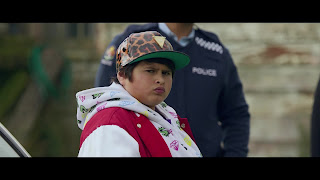One thing I look forward to over winter break is watching comfort food movies. I don’t mean movies about mac and cheese and beef stew, but rather those films that you can return to over and over again and they always make you happy because they’re familiar and comforting. During the long, listless days between Christmas and New Year’s when the only thing to do is a whole lotta nothing, I enjoy sitting down with my family and watching movies we’ve seen a million times but that never get old. Some of our favorites are Napoleon Dynamite, Nacho Libre, Moonrise Kingdom, and Fantastic Mr. Fox. Napoleon and Nacho were directed by Jared Hess and Moonrise and Fox were directed by Wes Anderson. Even though they seem wildly different on the surface, the four films actually have a lot in common. Each one seems absurd on the surface but isn’t; is delivered with a flat, deadpan approach; deals with outsiders desperately wishing they were someone or somewhere else; and has a warm, little heart of humanity and compassion at its core.
This winter, my family is going to add a new comfort food
movie to our annual list: Hunt for the
Wilderpeople. Written and directed by Taika Waititi (TY-kuh WHY-tee-tee)
and set in his native New Zealand, it’s the story of Ricky Baker, a sullen,
overweight thirteen year old in the foster system. After getting bounced around
to numerous homes, he lands at a small shack at the edge of the wilderness with
Bella and Hec, an older childless couple. Ricky is a lazy brat, but Bella’s
love and charm quickly win him over. Hec, played by veteran actor Sam Neill,
has neither love nor charm and barely tolerates the boy. This becomes a problem
when Bella dies unexpectedly and circumstances lead to Ricky and Hec on the run
from the law, roughing it in the bush. This set-up makes the film sound more
serious and dire than it actually is. While there are a few moments of true
sentiment as when Bella dies, most of the film is played for laughs. Ricky’s
mouthy, gangster-loving immaturity clashing with Hec’s grumpy, backwoods
silence is funny. The various eccentrics they run into on their months-long
flight from authority are quirky and amusing. The tone walks the fine line
between irony and sentiment, a place not many directors can manage to stay for
long.
Hunt for the
Wilderpeople borrows Wes Anderson’s trick of dividing his movie in
writerly-sounding chapters and Jared Hess’s deadpan delivery of utterly
ridiculous dialogue. The sequence in which Bella kills a wild boar armed only
with a knife might as well have been filmed and edited by Wes Anderson himself,
and Psycho Sam, the crazy extremist recluse who assists Hec and Ricky, could be
Napoleon Dynamite’s Uncle Rico a few years down the road.
The film shares both directors’ penchant for absurdity
mingled with heart. True absurdist literature suggests that the world has no meaning
and that everything we do in the world is ridiculous. Like the films of
Anderson and Hess, Waititi’s movie toys with that idea, often showing how silly
and ineffectual our efforts are. Bella’s funeral, Ricky’s attempts to run away,
and Paula, the crazed social services worker who pursues the boy and Hec all
get right up to the edge of absurdism. But thankfully, all the films I’ve
mentioned back away from that edge and suggest that while, yes, life is
sometimes ineffectual and ridiculous, in the end, there is love and friendship,
forgiveness and beauty in the world to give all that silliness meaning. Or to
at least make it bearable. Hunt for the
Wilderpeople ends up being sweet and hopeful, rather than bleak and empty.
Bundled up with my family on a long winter afternoon, looking at the beginning
of a new year, sweet and hopeful sound comforting to me.



No comments:
Post a Comment